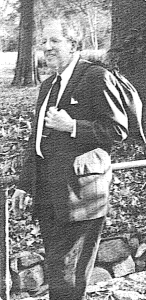 Kenneth J. Reckford offers a feast for mind and spirit
Kenneth J. Reckford offers a feast for mind and spirit
By Philip Stadter in the Fall 2002 Department newsletter Tabulae.
In forty-three years of teaching at Chapel Hill, Prof. Kenneth Reckford has always delighted students and friends with his endless capacity for wonder. He once startled his students in his course, “the Heroic Journey,” by bringing a rose to class: poets and literary critics, he told them, often talk of a rose as a symbol or image, but a rose is first of all something real and tangible, a flower beautiful and fragrant, which buds, blooms, and wilts. His courses, like his life, have been filled with wonder: for roses, for friendship, for the human generosity and endurance painted so vividly in Homer, Vergil, Dante, Eliot, and Tolkien. His courses created lasting impressions: a student who once took “the Heroic Journey” now runs an on-line financial information webpage, on which he mentions how Kenneth’s lessons on the Lord of the Rings help to inform today’s financial world.
Kenneth, who plans to retire at the end of this year, received a B.A. summa cum laude from Harvard, and completed his Ph.D. there three years later. During those same years he held a Fulbright in Rome and began with his wife Mary a family which would grow to five children. He joined the Department here in 1960, was appointed full professor in 1969, and Kenan Professor in 1994. Since Mary’s untimely death in 1987, he has married Charlotte Orth (and taken on two more children), with whom he continues the tradition of festive hospitality for students and friends in the house on Franklin Street.
Horace, lyricist and satirist, so perceptive and forgiving of human weakness, documenting the constant ambition to live wisely, moderately, joyfully, has been a constant companion from his freshman year at Harvard. Kenneth has taught the odes and satires frequently, and written about them in an early, deeply felt introduction to the poet (Horace, l969) and a string of articles, most recently a thoughtful, sensitive, and imaginative reexamination of that old favorite, the trip to Brindisi: “Only a wet dream? Hope and skepticism in Horace Satire l .5″ (1999). Horace accompanies him in the constant quest to blend the old and new, as in his moving Presidential Address to the APA this January, “Pueri ludentes: some aspects of play and seriousness in Horace’s Epistles.”
A lover of Pooh and of Frank Baum’s Oz books (see his articles in the Baum Bugle), he has taken special delight in Aristophanes’ outrageous comedy of food, obscenity, politics, and the unfailing triumph of the human spirit. A profound meditation on his favorite comedy, the Clouds, forms the backbone of his book Aristophanes’ Old and New Comedy (1987). His ridiculous enactments of comic scenes-a braggart warrior with a colander for a helmet, for instance-were the delight of his students. He has constantly insisted on the importance of performance for ancient drama, especially comedy. I still recall with delight the performance of the Clouds he staged at Harvard in 1959, with the chorus swirling in diaphanous veils. In conjunction with UNC students, he has staged Plautus’ Mostellaria, Rudens, and Curculio; the tradition still continues. He has found a special affinity between Aristophanes and contemporary playwright Tom Stoppard: a reading of Stoppard’s The Invention of Love, which Kenneth participated in, was a highlight of January’s APA meeting.
Celebrations, clowns, and festivities Kenneth finds essential to living: he is proud of his jester’s cap, which he may wear even while lecturing. He insists on the human values and deep resonances of play. Yet he will sometimes introduce himself as a teacher of “Laughing and Grief,” recalling the crab who taught Lewis Carroll’s Gryphon. Aristophanes’ laughter arises from and despite the grief of the human condition. This may explain his love of Euripides’ plays, which have alternated in his graduate courses and articles with Aristophanes and the Latin poets. He has translated (with poet Janet Lembke) two of Euripides’ most desperate plays, Hecuba (1991) and Electra (1994), exploring with the tragedian human despondency, viciousness, and violence.
His students and colleagues have found that the classical authors are not a field of study for Kenneth, but a fountain of life flowing with the sorrow, the compassion, the striving, and the achievement of the human condition. As one student, now a colleague, has written, “Kenneth Reckford’s visionary approach to classical studies makes classics more than a job, more than a profession: it becomes a way of life. His uncompromising standards and profound humanitas have inspired an entire generation of students, so that ancient texts don’t just live anew: they actually affect the way we live our lives.”
Not only is Kenneth a passionate teacher himself, he has constantly pushed the department and the university to teaching excellence. From giving excellent teaching a major role in tenure documents to twice serving on university committees to restructure fundamentally the curriculum, he has been an advocate of students. His commitment to undergraduate teaching has been recognized by two Tanner Awards and a term appointment as Bowman and Gordon Gray Professor.
Kenneth has been generous in sharing himself with the profession as President of the APA (2001-2) and President of CAMWS (1975-76) and in numerous lesser positions. He has often been invited to lecture at other universities. In 1999 he delivered the Martin Lectures at Oberlin, “In Search of Persius” extending his exploration of another favorite Roman satirist, who lays bare the hypocrisy of his contemporaries and urges Stoic selfknowledge. This spring Kenneth will again teach “the Heroic Journey.” Once more he will guide his students through suffering and hard-won and frustratingly incomplete success. They will hear the wisdom of a scholar thoroughly imbued with the deepest insights of ancient literature. It will be an experience few will forget.
For the original document see Tabulae 2002